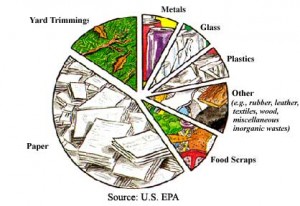
Tonight at Sociology Professor Barnum’s Soup and Bread discussion in Dickinson’s Treehouse: The Center for Sustainable Living, we covered a variety of issues, one of them being trash. In a consumer society where items are created to last no more than three years, trash has become a much bigger part of American society than most Americans realize. According to Forbes, the U.S. is responsible for producing ¼ of the world’s waste, meanwhile making up only 5% of the world’s population. That’s way too much trash, and too much trash too responsibly remove from society.
How did Americans become so unaware of their waste habits? After all, according to Edward Humes, author of Garbology, per capita waste levels have doubled in the U.S. since 1960. Think of the phrase “out of sight, out of mind”. Once an American puts the garbage out on the side of the curb each week, the trash is no longer their problem and they can move on to collecting waste for the next week. The rest of the world, however, is not so ignorant toward the U.S.’s trash problem. Just take the floating trash island in the Pacific- an “island” made of plastic debris deposited into the ocean which will never fully decompose.
[youtube_sc url=”https://www.youtube.com/watch?v=fKBWNVNzaPo”]When there were no municipal waste programs (granted there were, however, major health problems), people were reminded constantly of their trash- by its smell and its appearance. With American’s desire for homes to look pristine and neat, trash could definitely get in the way of this. If American’s were forced to deal with their trash for more than seven days at a time, actions and attitudes might be different. Disposable toothbrushes, Brillo Pads, and excessive paper handouts would feel more threatening once they needed to be stored for more than a week, making them no longer out of sight and so hopefully no longer out of mine. With a more “in your face” approach to America’s trash, the disgusting and greedy extent of its waste products could possibly decrease.
A good link to check out: www.zerowasteamerica.org.
